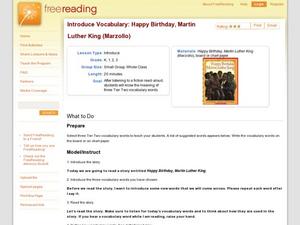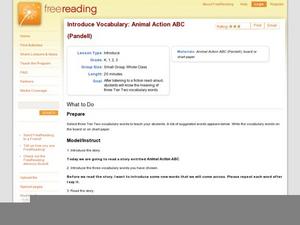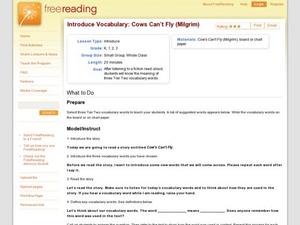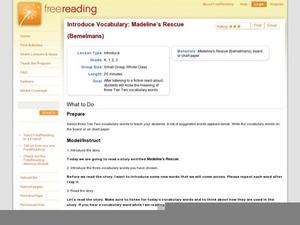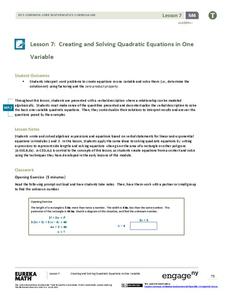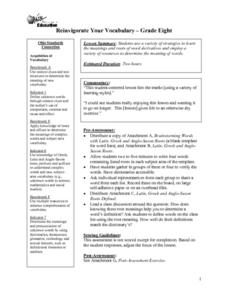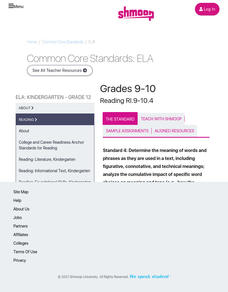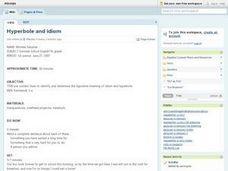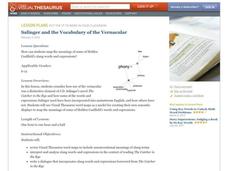Curated OER
Introduce Vocabulary: Curious George Rides a Bike (Rey)
Are your learners curious about new words? Take them on an adventure with Curious George as they learn vocabulary in the context of H.A. Rey's book, Curious George Rides a Bike. Prepare budding readers by introducing the terms before...
Curated OER
Introduce Vocabulary: Giggle, Giggle, Quack (Cronin)
Farmer Brown has his hands full with a tricky duck in Norah Cronin's book Giggle, Giggle, Quack, the context of this vocabulary study. This text is available on YouTube if you can't find it. Before reading, introduce the high level...
Curated OER
Introduce Vocabulary: Happy Birthday, Martin Luther King (Marzollo)
Looking for a vocabulary lesson relevant to MLK Day? Try this reading comprehension idea designed around Jean Marzollo's biography Happy Birthday, Martin Luther King. Go over new terms (freedom, justice, leadership, and talent) before...
Curated OER
Introduce Vocabulary: How Do Dinosaurs Say Goodnight? (Yolen and Teague)
If you are reading Jane Yolen's fun story How Do Dinosaurs Say Goodnight?, use these strategies to enhance the experience for budding readers. What new words will they learn? Find detailed comprehension questions for these in-text words:...
Curated OER
Introduce Vocabulary: One Hungry Monster (O'Keefe)
Combine counting and vocabulary practice with Susan O'Keefe's engaging story One Hungry Monster, which you can find on YouTube if needed. Introduce learners to the following in-text words: doubt, gargle, rude, swear, and underneath....
Curated OER
Introduce Vocabulary: Tar Beach (Ringgold)
Anyplace can become a beach! Budding readers explore Faith Ringgold's world of imagination in her book Tar Beach, which can be found on YouTube if you don't have it. What words will budding readers learn? They focus on the following...
Curated OER
Introduce Vocabulary: Animal Action ABC (Pandell)
Get your kinesthetic learners engaged in a vocabulary study using Karen Pandell's book, Animal Action ABC. They move around as you read, and raise their hands whenever they hear one of the words you are learning. Pre-teach the terms:...
Curated OER
Introduce Vocabulary: Cows Can't Fly (Milgrim)
Cows can't fly, can they? David Milgrim's whimsical story makes vocabulary fun! Although this strategy can be used with any text, using Cows Can't Fly will be a breeze with this outline. Pupils are ready to raise their hands when they...
Curated OER
Introduce Vocabulary: Gregory, the Terrible Eater (Sharmat)
Help budding readers learn words like develop and revolting as they listen to you read Mitchell Sharmant's Gregory, the Terrible Eater. Get the new vocabulary rolling before reading it aloud so youngsters can raise a hand when they hear...
Curated OER
Introduce Vocabulary: Dinosaur Bones (Barner)
Dig into some prehistoric vocabulary in Bob Barner's informative book Dinosaur Bones. This works best if you introduce the primitive words before reading the story. These are the focus terms in the text: ancient, climate, extinct,...
Curated OER
Antonyms, synonyms and homophones
Shed light on what antonyms, synonyms, and homophones are. For this lesson, upper elementary schoolers create pairs using an antonym, a homophone, and/or a synonym. Then they play an antonym matching game.
Curated OER
Introduce Vocabulary: Madeline's Rescue (Behelmans)
What new adventure is Madeline on now? Emerging readers expand their vocabulary in Ludwig Behelmans' story Madeline's Rescue. Although there are many words you could focus on here, five have been furnished with comprehension...
Curated OER
Introduce Vocabulary: Doctor DeSoto (Steig)
William Steig's story of a witty mouse couple will have scholars intrigued as they listen for new vocabulary words and context clues. Doctor DeSoto can be found on YouTube in case you don't have it. Emerging readers expand their...
EngageNY
Mid-Unit Assessment and Discussing Themes in Esperanza Rising: (Chapter 9: "Las Ciruelas/PLums")
Give this skills-based assessment halfway through your unit on Esperanza Rising. After a brief review, class members take the test, which asks them to show that they know how to analyze the novel independently. They are asked to...
EngageNY
Creating and Solving Quadratic Equations in One Variable
Give your classes practice at modeling using quadratic models with a resource that uses area and integer problems to allow individuals to create second degree polynomials. Young mathematicians solve equations using factoring and then...
Curated OER
My Reading Words in My Social Studies Book?
Connect social studies and language arts using this resource. After studying root words, have learners locate five words from their social studies book that have a prefix, suffix, or root word. This puts a new twist on practicing basic...
Curated OER
Reinvigorate Your Vocabulary
Eighth graders participate in a variety of activities to examine the meanings and roots of word derivatives and the meanings of words. Using context clues, they determine the meanings of words omitted from a passage and complete a prefix...
Shmoop
ELA.CCSS.ELA-Literacy.RI.9-10.4
Your pupils will be expected to determine the meaning of words and how those words affect the meaning of a text. Help them master this skill with the ideas listed here. First, look over the two activities that could be used for your...
Curated OER
Hyperbole and Idiom
Seventh graders use context clues to determine the figurative meaning of idioms and hyperboles. They practice writing idioms and hyperboles in sentences about real life situations around them. This lesson is a good way to improve variety...
Curated OER
Salinger and the Vocabulary of the Vernacular
Writers explore vocabulary and expressions used in the English language. They use visual word maps to become aware of the different uses of words which will allow them to more readily interpret texts. Then they listen to/read excerpts...
Curated OER
Simile and Metaphor
Middle schoolers use context clues to find the figurative meaning of similes and metaphors in writing. They practice using figurative language to help their writing come alive. Use this activity in a lesson about poetry, figurative...
Curated OER
Introducing Synonyms to Early Writers
Upper elementary schoolers examine the concept of synonyms and how using a variety of vocabulary through synonyms can expand their writing skills. They revise a paragraph using synonyms located on the Visual Thesaurus and participate in...
Curated OER
Visual and Meaning Cues
Learn how to apply visual and meaning cues to reading unknown words. Readers will explore what to do when they come to a word they do not know as they watch the teacher model the use of these cues and then participate in guided and...
Curated OER
Structure and Meaning Cues
First graders use cues to identify unknown words. They will learn strategies to assist them in decoding while reading. Then they discuss how to listen to themselves read in order to decide whether or not the word makes sense in the...




